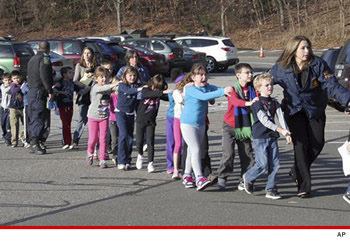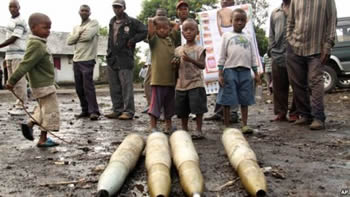America's Infanticide:
No Cheap Comfort
For Sunday January 6, 2013
Epiphany Sunday
Lectionary Readings (Revised Common Lectionary, Year C)
Isaiah 60:1–6
Psalm 72:1–7, 10–14
Ephesians 3:1–12
Matthew 2:1–12
Sentimentality is one of the greatest enemies of the gospel. Perhaps we're most susceptible to this danger at Christmas time with the stories about the birth of Jesus. What parent hasn't gushed with pride watching his child play a shepherd in a bathrobe? I know I have. It's difficult to read "they wrapped him in swaddling clothes" and not melt into a puddle of sentimentality.
Matthew's gruesome gospel disabuses us of all such Hallmark readings of the Bible. He yanks us back into the violent political realities "during the time of king Herod" (2:1). The story of the pagan magi worshipping Jesus ends abruptly when king Herod slaughters innocent children in order to strengthen his rule.
 |
Sandy Hook Elementary School in Newtown, Connecticut. |
This ancient infanticide is re-enacted today all around the world — at Sandy Hook Elementary School; in Damascus, where children are blown to bits by their own government; in Goma, where violence, starvation, and infant mortality ravage families in the deadliest conflict since WW2; in the gendercide of 100 million girls, as reported by the Nobel economist Amartya Sen back in 1990; and every time a politician mimics Herod to protect his power.
As it so often does, the stories in Scripture anticipate our worst impulses, and provide alternative scripts to live a different way.
With Christmas carols echoing in our ears, the church liturgical year pivots sharply from celebration to lamentation, and a most unlikely feast day — "the slaughter of the innocents." The church honors the toddlers of Bethlehem as the first martyrs of the gospel. By the late fifth century the "slaughter of the innocents" was the subject not only of church liturgy, art, and literature, but also mentioned in culture at large.
Whereas the pagan magi of Persia worshipped the baby Jesus, Herod of Rome tried to kill him. He had, after all, murdered his own sons, one of his wives, and countless opposition (cf. Josephus). We don't normally consider the birth of a baby a threat to political power, but Matthew does. His political parody is transparent. Give credit where it's due; Herod sensed a threat to his power and so he tried to exterminate it.
Matthew contrasts two rival kings who rule not only over one people (the Jews), but over all the world. One king must give way. The subplot about king Herod almost overshadows the main plot of the adoration of the magi.
The magi came to worship Jesus (2:2). Upon seeing Jesus and Mary, “they bowed down and worshipped Him,” offering him gifts of gold, incense and myrrh. Herod tells his confidants that he too wants to worship Jesus (2:8), but that's a lie. It's also a reminder for us today when politicians flaunt their faith. Matthew says that when king Herod heard the news of another king, he responded in fear, paranoia, and then infanticide.
 |
Syrian child wounded by bombing of Damascus. |
Herod "the Great" (c. 73–4 BC), as he was known, had been given the title “King of the Jews” in 40 BC, and after consolidating his power he ruled over Judea for 33 years. Infamous for his brutality, he would countenance no rival over his Judean domain. He was so suspicious and insecure that he called a secret meeting of religious leaders and extracted information about the exact time and place of the birth of the new king, Jesus, knowledge that would later prove lethal.
After worshiping Jesus, the magi returned to their country. But God warned them in a dream not to return to Herod, who had demanded that they come back with precise information. They disobeyed Herod (another lesson for us) and returned home “by another route.” When he learned that the magi had tricked him, Herod erupted in a furious rage and murdered all the male children two years old and younger who lived in Bethlehem and its vicinity.
Meanwhile, Mary, Joseph and the baby Jesus fled to pagan Egypt to find protection. The political ironies in the flight to Egypt are remarkable. The infant Son of God fled as a displaced refugee to a foreign country, Egypt, Israel's sworn and symbolic enemy that had oppressed the Hebrews for 430 years. The place where Pharaoh had unleashed his own infanticide against the firstborn Israelite children (Exodus 1:6–22) became a refuge for the baby Jesus.
In the end, and as with the Egyptian Pharaoh, it was king Herod "the Great" who died, about 4 BC. And just as the baby Moses survived Pharaoh's mass murder, so too did the baby Jesus survive Herod's infanticide. King Jesus returned to settle in the town of Nazareth in the district of Galilee, although he was careful to avoid Herod's son Archelaus who took his place.
There are actually five Herods in the New Testament, and they all persecuted Jesus and the early church. In addition to Herod the Great, there is his older son Archelaus born of his wife Malthace (Matthew 2:22), who reigned only a few years and was deposed in 6 AD. Herod's younger son by Malthace, Herod the tetrarch (Luke 3:19), is famous for murdering John the Baptist on a dinner party dare because John denounced his affair with his brother's wife (Mark 6:14–29), and for his encounter with Jesus at his trial (Luke 23:7). Fourth, there's Herod King Agrippa (Acts 12:1), the grandson of Herod the Great, who murdered James and tried to murder Peter (Acts 12:1ff). Finally, there's King Agrippa's son, also named Agrippa, who bantered with Paul amidst great pomp, and sneered that Paul was trying to convert him (Acts 25:13–26:32).
All these Herods do the opposite of the magi; they try to make the subversive kingdom of Jesus subservient to their political power. But these Herods, whether ancient or modern, are right about one thing; if Jesus is Lord, then caesar is decidedly not lord.
 |
Goma children. |
In her own reflections on the slaughter of the innocents, Lutheran pastor Pam Fickenscher observes: "You could make a good argument that we should save this story for another day — Lent, maybe, or some late night adults-only occasion. But our songs of peace and public displays of charity have not erased the headlines of child poverty, gun violence, and even genocide. This is a brutal world. Today the victims are statistically less likely to be Jewish and more likely to be from Darfur, or Zimbabwe, or Iraq, but the sounds of Rachel weeping for her children are not uncommon. If we could hear them, they would drown out our cheerful, tinny carols every 20 seconds or so."
The birth of Jesus is the antidote to all sentimentality and every form of cheap comfort. Rather, the events surrounding his birth remind us how the savior of the world "shared in our humanity" and was "made like us in every respect." Because he himself suffered our every pain and sorrow, beginning with infanticide at his birth and ending with his violent execution as a criminal, "he is able to help those who suffer" (Hebrews 2:10–18).
Image credits: (1) tmz.com; (2) alhittin.com; and (3) VOA Congo Story: War, Women and Rape.





